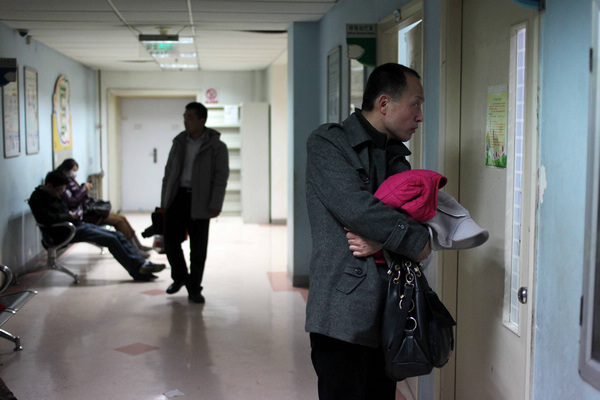Healthy cut in cost of medicine
Updated: 2012-03-13 07:32
By Jiang Xueqing and Yang Wanli (China Daily)
|
||||||||
Supervision demand
Creating a better compensation system is just one reform for public hospitals, said Chen Zhu, who added that authorities should also strengthen their supervision of treatments and spending with performance appraisals.
 |
|
The Capital Institute of Pediatrics is one of the busiest hospitals in Beijing. [Wang Jing / China Daily] |
The health bureau in Shanghai's Minhang district launched a computer network to collate real-time data on its hospitals in 2010. It allows officials to evaluate the quality and safety of clinical facilities and treatments, such as the amount of antibiotics prescribed by doctors.
Appraisal reports are produced every three months and play a major role in maintaining discipline, as well as decisions on funding.
Minhang's public hospitals, which shared more than 400 million yuan from the health bureau in 2011, are given annual targets and are judged on a series of indicators, such as the average amount spent per outpatient. If they fall short, their subsidies are reduced.
"Supervision of public hospitals (nationwide) must be improved," said Xu Su, director of the district health bureau. "Healthcare reform will succeed once government funds are allocated based on supervision. Only in this way will money play an effective role.
"The problem now is that government supervision is not in place and medical expenses are out of control," he added.
Zhenjiang has adopted a similar system to subsidize hospitals based on the number of outpatients, while the city also reduces funding for clinics where patients are prescribed an excessive amount of medication.
"When I was the president of a hospital, I used to fine doctors the same amount as the value of the excessive drugs they prescribed," said Lin Feng, director of the city health bureau. "Hospitals should not only encourage doctors with financial incentives but also restrain their behavior."
He disagreed with calls to entirely remove the markup on drugs, saying that the price should include the cost of storage, wastage and labor. With this in mind, he said an 8-percent hike on the purchase price is justifiable.
Lin added that the compensation system can also help balance out resources.
As Zhenjiang's latest medical insurance policy covers 90 percent of all medical expenses incurred at community health centers, compared with 60 percent at top hospitals, more patients are now using smaller facilities.
Jiankang Road Community Health Center, for example, saw the number of outpatients it handled increase from 160,000 in 2005 to 370,000 cases last year.
However, Zhu Chenping, deputy director of the center, said that just 36 employees have been recruited over the same period.
Contact the writers at jiangxueqing@chinadaily.com.cn and yangwanli@chinadaily.com.cn.

 Relief reaches isolated village
Relief reaches isolated village
 Rainfall poses new threats to quake-hit region
Rainfall poses new threats to quake-hit region
 Funerals begin for Boston bombing victims
Funerals begin for Boston bombing victims
 Quake takeaway from China's Air Force
Quake takeaway from China's Air Force
 Obama celebrates young inventors at science fair
Obama celebrates young inventors at science fair
 Earth Day marked around the world
Earth Day marked around the world
 Volunteer team helping students find sense of normalcy
Volunteer team helping students find sense of normalcy
 Ethnic groups quick to join rescue efforts
Ethnic groups quick to join rescue efforts
Most Viewed
Editor's Picks

|

|

|

|

|

|
Today's Top News
Health new priority for quake zone
Xi meets US top military officer
Japan's boats driven out of Diaoyu
China mulls online shopping legislation
Bird flu death toll rises to 22
Putin appoints new ambassador to China
Japanese ships blocked from Diaoyu Islands
Inspired by Guan, more Chinese pick up golf
US Weekly

|

|






